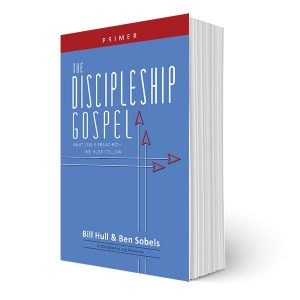LOOK FOR FRIENDS AMONG YOUR OFFENDERS

Have you ever done an inventory of your friendships? Who are your friends? Where did you meet them? What is the story behind the relationship? Ironically, some of my best friends used to be my “enemies.” Well, maybe not enemies, but not the ones I initially wanted a relationship with based on their opinions or personality. The same can be said regarding the disciple-making relationships we strive to develop from everyday connections. Sometimes we are drawn only to a “type,” when the Lord wants us to expand our relational network. We’ve got to be careful, lest we only develop relations with people “like us.”
As I reflect on my history and pattern of developing relationships for the glory of Christ, one failed opportunity still haunts me. I remember it like yesterday. Our church needed to relocate and we felt like we found a building that could be renovated to suit our needs. The only problem was that it wasn’t zoned for religious gatherings. So, we sent in our application for rezoning and waited to present our request to the urban planning office. At the time, I was pastoring an English congregation in Montreal, Quebec. Just a little background—Quebec is a wonderful North American province, rightly characterized as one of the most unreached populations regarding the gospel in the Western Hemisphere. It is extremely secular, post-Christian, and amoral. The average person on the street has never been in a church outside of a funeral, wedding, or nominal Christening, and those are very few. Therefore, I really should not have been too shocked by what I would experience.
I waited in the office of urban planning for more than an hour. They were waiting for a very old pastor and I was in my late 20s. Needless to say, they were confused by the church’s representative. So confused that the zoning director invited me to his office and closed the door and the blinds so no one could see or hear his behavior. Upon being seated the zoning director used the worst of foul language to let me know he thought I represented and actively perpetuated a myth (Christianity) to people and he was insulted that I had dedicated my life to the cause of this “fictitious belief.” I came to that office to get my church’s zoning request, not have a debate about our faith. Yet, I remained calm, focused on the merits of our request, and did my best to advocate for our needs. Needless to say, our request was denied.
Typically, I remember that experience as a testimony of a “post-Christian” Quebecois culture. Now, however, I see it increasingly as an opportunity I was too narrowly focused to see. Once I realized there was no chance of getting the rezoning, I could have pivoted the conversation. I could have invited him to lunch for a conversation separate from the zoning request. However, the idea of inviting him to a meal never came to my mind. I never sought to look at what was behind his deep disgust of my personal faith. I allowed an ideological disagreement and an act of disrespect to shipwreck my opportunity for a relationship.
I was so laser-focused on getting the zoning status changed, that I forgot to see the person who was the zoning officer. I was so offended by his vulgarity, unprofessionalism, and view of my faith that I needed to just “wipe the dust off my shoes” and move on. I was persecuted and I took it like a soldier, so I naively thought. In reality, I probably left the situation alone prematurely. Bad attitudes, angry responses, and verbal attacks too often accomplish what they’re meant to—create enemies, adversaries, and punching bags. There is so little listening, so few conversations, and so few meals together that we can never move beyond the smoke screens of rage, hurt, disillusionment, and misinformation. Listen to the wisdom of the Spirit in Proverbs 17:9, “Whoever covers an offense seeks love.” At the end of the day, we must become more intentional about ensuring our attempts for friendships, relationships, and disciple making are fueled by grace and mercy.
All around us, the Lord is providing opportunities for relationships, we just have to see them as opportunities. The world will give us many reasons to reject, cancel, and rebuke people. The gospel, however, gives us many more reasons to love, forgive, overlook, and extend his grace so that we might develop friends. When we extend grace to others, strangers become friends, friends become disciples, and disciples become disciple makers who make friends with offensive people. The gospel we preach was initiated by the offended Christ! “God shows his love for us in that while we were still sinners, Christ died for us (Romans 5:8).” Christ was the greatest friend and initiator. He ate with disreputable people called “drunks and sinners” (Luke 15:2). He started the conversation with the Samaritan woman at the well (John 4:7). Jesus invited himself to Zacchaeus the tax collector’s house (Luke 19:5), which went against the norm of his culture. He even made disciples out of “thieves, traitors, and a terrorist” (Matt. 10:2-4). He set the model for us to look for friends, who would become disciples, from among our offenders.
It is so easy to cut off all the people who hurt and offend us, but in doing so we miss the miraculous work of redemption! We’ve got to trust the Lord to make disciples of our atheist neighbors, transgender coworkers, and our “leftist” in-laws. Remember, he’s the Savior, we’re just relational connectors.
Think about it, Jesus sent us to make disciples of people from all nations (Matt. 28:19). The Great Commission sends us to make friends with a strange and unfriendly world. Jesus put it like this, “I am sending you out as sheep in the midst of wolves, so be wise as serpents and innocent as doves (Matthew 10:16).” We really should expect to be offended! And our response to the offense must become grace, kindness, and mercy.
I often wonder, “What if I had turned that insult from the zoning director into a conversation between friends?” Today, if you and I determine ahead of time to “cover the multitudes of sins” among our offenders, we may find we will live with fewer regrets, louder laughs, a more diverse set of friends, and possibly more followers of Jesus!
This post originally appeared at: Look For Friends Among Your Offenders — The Bonhoeffer Project
If you have enjoyed reading this, please consider joining our email list!











